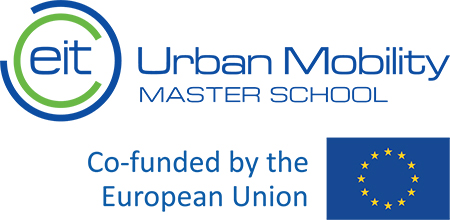MSc Transport, Mobility and Innovation (EIT Urban Mobility)
New technology and business models are changing the world’s cities and the way we get around. This change creates a need for engineers who can construct an urban environment that consumes fewer resources, is more sustainable, and provides more liveable communities and workplaces. The programme integrates traditional engineering disciplines with innovation and entrepreneurship.
Transport, Mobility and Innovation at KTH
The master’s programme in Transport, Mobility and Innovation is part of the EIT Urban Mobility Master School's programme Sustainable Urban Mobility Transitions.
The world’s cities are changing. New technologies, business models, and global sustainability goals are transforming our cities and how we move. Today’s urban planners and transport engineers face an array of challenges and are needed to take advantage of such transformations to help create urban environments that consume fewer resources, contribute less to climate change, and support more liveable and healthy neighbourhoods. Addressing such challenges requires embracing complexity and competence beyond the traditional urban planning and civil engineering disciplines, including entrepreneurial skills to steer innovations into practice. The Sustainable Urban Mobility Transitions programme provides such experience, preparing students to become the next urban innovators and leaders in urban mobility.
All programmes at the EIT Urban Mobility Master School have a unique study path:
- Students study one year each at two different universities, the “entry” university and the “exit” university. All options are located at a leading university in Europe in the field of urban mobility.
- Graduating students will be awarded two officially recognised Master of Science degrees, from each of the two universities. Moreover, the programme is designed so that students may attain the qualifications for the EIT Label certificate awarded by the European Institute of Innovation and Technology.
- During the first-year studies, students will be introduced to Innovation and Entrepreneurship, and participate in an extended Challenge Project. During the same year, students will acquire essential technical skills for working with urban mobility challenges.
- Between the first and second year, students will participate in a Summer School applying new skills to two different cities within Europe.
- In the second year, students will choose from several more specialised courses in both technical content as well as innovation and entrepreneurship. Students will also participate in a shorter challenge project that includes an internship at a company or organisation working to meet urban mobility challenges. To complete their degree, in the second year, students will carry out an independent master thesis, combining and demonstrating their full set of technical and entrepreneurial skills.
- You will have a wide range of career opportunities, within the public and private sector, as well as have the know-how to start your own business or conduct rigorous research.
Students may apply to start and end the programme at any of the seven universities. Students must attend a different university for Year 1 and Year 2. The available universities for the Sustainable Urban Mobility Transitions programme are:
- Aalto University in Espoo, Finland,
- Eindhoven University of Technology in Eindhoven, Netherlands,
- Ghent University in Ghent, Belgium,
- Polytechnic University of Catalonia (UPC) in Barcelona, Spain,
- University of Tartu in Tartu, Estonia,
- University of Lisbon - Técnico.IST in Lisbon, Portugal.
Future and career
The programme is aimed to educate, inspire, and unite future leaders in the Urban Mobility sector. The skills learned in this programme are in high demand in cities, transport authorities, research institutes and industries across Europe and worldwide. As a graduate, you will be an adaptable team player with a diverse set of analytical skills and theoretical knowledge in the field of urban mobility. For example, you can work as a transport engineer, city planner, experiment manager, technology strategist, public participation coordinator, policy advocate or adviser.



